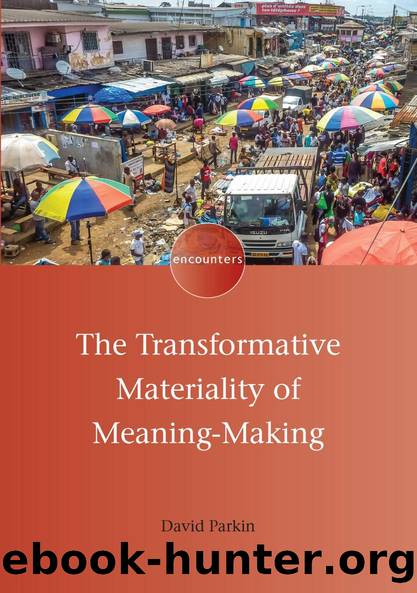The Transformative Materiality of Meaning-Making by David Parkin

Author:David Parkin [Parkin, David]
Language: eng
Format: epub
ISBN: 9781800411470
Barnesnoble:
Publisher: Channel View Publications
Published: 2021-08-18T00:00:00+00:00
Conclusion
At issue in this drive by this and other maalims are two contradictory tendencies. On the one hand, the maalim attempts to differentiate ever more finely the Islamic distinctiveness of his group of Muslim fishermen. In seeking increasingly refined concepts of religious purity, he focusses on language and, in doing so, identifies people with these language differences. Alleged speech differences are the most salient identity tag and come to summarise other differences, some desired as in the case of Arabic and high forms of Swahili, and some unacceptable and impure as in the case of the non-Muslim Mijikenda dialects. On the other hand, the maalim evidently believes in some kind of core Islamic purity, an ideal that can be attained through both speech and behaviour. But in seeking this ideal, he sets up one line of differentiation after another: speak Arabic and not Mijikenda; speak this Swahili variety and not that; incorporate Arabic words rather than Bantu words in Swahili vocabulary; use only phonemes judged to be most distant from non-Muslim usage. Since the maalim has constantly to admonish speakers for falling short of such expectations, he clearly never completely gets his community to reach this core of Islamic purity. All he can do is to attempt always to move away from what he regards as the contaminating effects of non-Muslim life and language. But this constant escape, so vividly captured in maulidi sermons given by himself and others (see Parkin 1985 and Chapters 9 and 10), becomes a ceaseless struggle to attain the purity he advocates. Like Zenoâs arrow which, in distancing itself further and further from its point of origin, nevertheless has to move through an infinity of mid-points, this and other maalims seem never to reach the puritanical destination. The play on language is, after all, a play on the endlessness of signification. Diglossia comprising high and low diatypes is one such play, which, having a life of its own, may fall through the net of government policy.
Note
(1) The Mijikenda are regarded as comprising nine sub-groups, the dominant one of which is that of the Giriama.
References
Akinnaso, F.N. and Ogunbiyi, I.A (1990) âThe place of Arabic in language planning in Nigeriaâ, Language Problems and Language Planning 14, 1, 1â20.
Baudrillard, J. (1972) Pour une critique de lâéconomie politique du signe, Paris: Gallimard.
Ferguson, C. (1964) âDiglossiaâ, in D. Hymes (ed.) Language in Culture and Society, New York, Evanston and London: Harper and Row.
Gilsenan, M. (1982) Recognizing Islam: an Anthropologistâs Introduction, London and Sydney: Croom Helm.
Guillaume, A. (1954) Islam, Harmondsworth, Middlesex: Penguin.
Habermas, J. (1983) [1981] âModernity- an incomplete projectâ, in H. Foster (ed.) Postmodern Culture, London and Sydney: Pluto Press.
Lacunza Balda, J. (1991) âTendances de la litterature islamique swahiliâ, in Francoise Le Guennec-Coppens and Pat Caplan (eds) Les Swahili entre Afrique et Arabie, Paris and Nairobi: Credu Karthala.
Lyotard, J.F. (1984) [1979] The Postmodern Condition: a Report on Knowledge, Manchester: Manchester University Press.
Mintz, S. (1985) Sweetness and Power, London and New York: Penguin.
Parkin, D. (1985) âBeing and selfhood among intermediary Swahiliâ, in J.
Download
This site does not store any files on its server. We only index and link to content provided by other sites. Please contact the content providers to delete copyright contents if any and email us, we'll remove relevant links or contents immediately.
| Anthropology | Archaeology |
| Philosophy | Politics & Government |
| Social Sciences | Sociology |
| Women's Studies |
Born to Run: by Christopher McDougall(7127)
The Leavers by Lisa Ko(6948)
iGen by Jean M. Twenge(5416)
Sapiens by Yuval Noah Harari(5372)
Spare by Prince Harry The Duke of Sussex(5197)
The Kite Runner by Khaled Hosseini(5180)
Machine Learning at Scale with H2O by Gregory Keys | David Whiting(4313)
Bullshit Jobs by David Graeber(4192)
Never by Ken Follett(3957)
Goodbye Paradise(3810)
Livewired by David Eagleman(3775)
Fairy Tale by Stephen King(3399)
A Dictionary of Sociology by Unknown(3085)
Harry Potter 4 - Harry Potter and The Goblet of Fire by J.K.Rowling(3074)
The Social Psychology of Inequality by Unknown(3031)
The Club by A.L. Brooks(2926)
Will by Will Smith(2920)
0041152001443424520 .pdf by Unknown(2846)
People of the Earth: An Introduction to World Prehistory by Dr. Brian Fagan & Nadia Durrani(2739)
